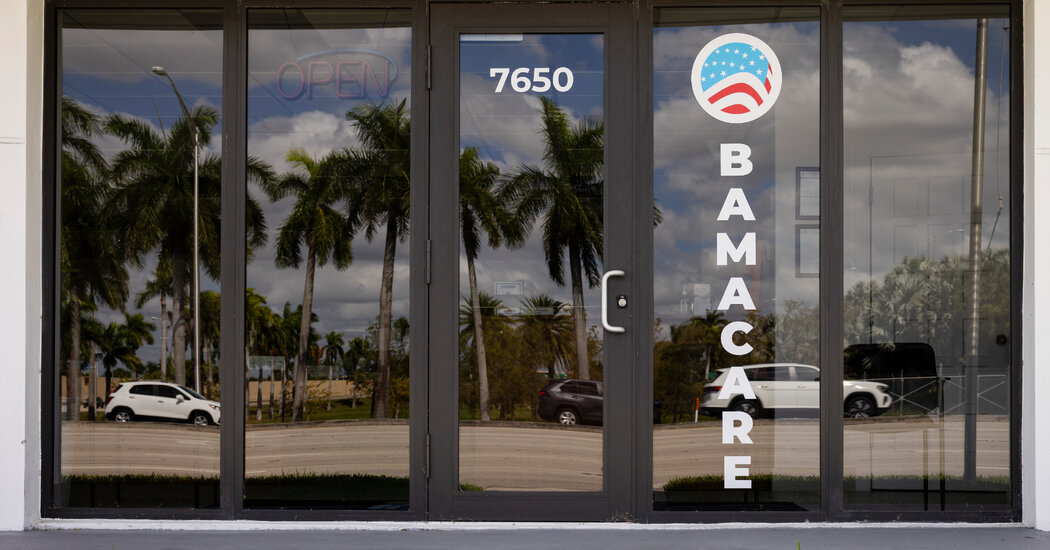If the extra subsidies that help Americans pay for Obamacare insurance plans expire at the end of the year as expected, the most intense reverberations will be felt in South Florida, the country’s top market for the coverage.
As many as a third of the 4.7 million Floridians on Affordable Care Act plans could drop them next year because of the higher costs, according to some estimates.
Françoise Cham, who is 63 and self-employed in the Miami suburbs, hopes she will be able to afford coverage until she can sign up for Medicare at 65. Heather Slivko-Bathurst, 37, expects to have to switch her family in Key West to the skimpier coverage offered through her job at a boating company. Lorraine Avila, a 46-year-old housekeeper in Miami, thinks she is likely to give up coverage altogether, which terrifies her.
“I take care of my kids and my grandkids,” Ms. Avila said. “If I don’t have insurance, how can I take care of myself?”
The state’s demographics help explain its high demand for Obamacare: Florida is full of low-wage service and gig workers who cannot get insurance through their jobs, self-employed people and early retirees who are not yet eligible for Medicare.
It is also one of only 10 states that have not expanded Medicaid, the federal health insurance program for low-income people, as allowed under the Affordable Care Act.
Obamacare established government marketplaces where people can buy private insurance using federal subsidies to help keep prices affordable. Enrollment in Obamacare plans soared nationally during the pandemic, when Congress increased the subsidies, in the form of tax credits, that help most people with the coverage pay their premiums. But the extra subsidies are set to expire on Dec. 31. A partisan standoff over whether and when to extend them is the main reason for the ongoing government shutdown.
In Florida, the uncertainty has resulted in a political throwback of sorts. Suddenly, the state’s politicians are talking about the Affordable Care Act again, often in urgent terms, 15 years after President Barack Obama signed it into law and several election cycles after it faded as a campaign issue.
Florida politics have changed so much in that time that the former presidential battleground state is no longer considered competitive. Miami-Dade County — ground zero for Obamacare, with more than 30 percent of residents on such plans — now votes Republican, as does the state overall.
Democrats from Miami to Orlando have spent weeks sounding alarms about the expiring subsidies. Open enrollment for 2026 plans is supposed to begin on Nov. 1, and insurers have started to notify enrollees that big premium increases are coming.
The biggest impact would be felt by older people at the lower edge of the middle class. Many people in their early 60s who earn around $65,000, for example, would experience a sharp increase in premiums — from a few hundred dollars a month to $1,000 or more.
“The federal government can afford whatever it wants to afford,” Representative Frederica S. Wilson, a Miami Gardens Democrat, said in an interview. “What is the price to pay for the health care of a human being?”
About 35 percent of the population in her district is on an Obamacare plan, according to Kaiser. That is one of the nation’s highest rates.
Gov. Ron DeSantis and some other Florida Republicans have painted the higher subsidies as a boon for insurance companies at the expense of taxpayers, suggesting that the comprehensive coverage provided by Obamacare plans is not worth the cost.
The Congressional Budget Office estimates that permanently extending the enhanced subsidies would cost the federal government nearly $350 billion over the next 10 years.
Mr. DeSantis said last week that “most people, particularly under 50, what they really need is a catastrophic plan that’s affordable.” He appeared to be referring to a type of insurance, more common before the Affordable Care Act, that covers fewer medical services and has high out-of-pocket costs.
Republican members of Congress whose districts are full of Obamacare customers have been quieter. But this week, Representative Carlos A. Giménez, whose Miami-based district has one of the highest enrollment rates in the country, was among 13 House Republicans who wrote a letter to Speaker Mike Johnson pleading for a solution.
Many Floridians with the plans would be eligible for Medicaid if the state expanded the program. An organizing committee began collecting petition signatures last year to put Medicaid expansion on the 2026 ballot, since the Republican-controlled Legislature continues to oppose passing it. But the group has delayed its efforts until the 2028 election, citing a recent state law making citizen-led ballot initiatives more difficult.
Alexis Bakofsky, the deputy commissioner for life and health insurance for the Florida Office of Insurance Regulation, told state lawmakers this month that the number of Obamacare enrollees in the state doubled from 2021 to 2024, after the extra subsidies went into effect. From 2024 to 2025, enrollment grew by another 400,000 people, she said.
State Representative Robin Bartleman, a Democrat from Broward County, in South Florida, urged Ms. Bakofsky’s office to proactively notify enrollees about the rate increases and prepare for a flood of people seeking help.
“This crisis is going to happen,” Ms. Bartleman said, “and we’re all going to get blamed.”
Enrollees said that living in Florida has gotten much more expensive in the four years since the enhanced subsidies kicked in.
“You go to the supermarket, and it’s like, food is crazy,” Ms. Cham said. “And to not be able to have insurance at an affordable cost, at an affordable premium, it’s unacceptable.”
Having an Obamacare plan for nearly 15 years has allowed Ms. Cham to remain self-employed while raising a daughter on her own and taking care of a brother with paralysis and their mother with dementia.
The higher subsidies brought her premiums down to zero, she said. She has since started paying $50 a month to also cover her daughter after she turned 18.
In Key West, Ms. Slivko-Bathurst said she and her husband pay nearly $800 a month to cover themselves and their toddler. Without the subsidies, she said, she would pay $2,000 a month. A few weeks ago, the couple started talking through the “what ifs” of higher premiums. “Unfortunately, some of our non-negotiables are going to have to become negotiable in order for us to be able to afford anything,” Ms. Slivko-Bathurst said.
Her husband’s employer does not offer health insurance. Her employer offers insurance that provides about half as much coverage as the family’s Obamacare plan does, for the same price. That is likely what they will settle for next year.
“You’re paying a ton of money for very, very little,” she said.
People in other parts of the state are bracing, too. Kari C. Barlow, 56, who lives in Pensacola, said she never intended to rely on Obamacare long term after she left her job at a local newspaper nine years ago. Then she moved in with her aging parents to help care for them, started a freelance editing and writing business, and decided to keep her plan.
“I’ve changed the way I look at Obamacare,” said Ms. Barlow, who pays about $190 a month for her plan with the subsidies. “Before, I didn’t think it was going to be this pivotal in my life, this tool. But now, I will definitely feel the loss of it.”
She has started looking up clinics that offer sliding-scale prices and talked to her doctor about whether she might be able to drop any of her medications. She has also wondered whether she will have to take an office job outside of her field to afford insurance.
“I understand that people aren’t always happy about that tax break,” she said of the subsidies, “but in the big picture, I think in the U.S. tax code we have so many tax breaks for so many different things. Why shouldn’t health care be up there as a priority?”
Patricia Mazzei is the lead reporter for The Times in Miami, covering Florida and Puerto Rico.
The post In Florida, Obamacare Price Hikes Pose an Outsized Threat appeared first on New York Times.




